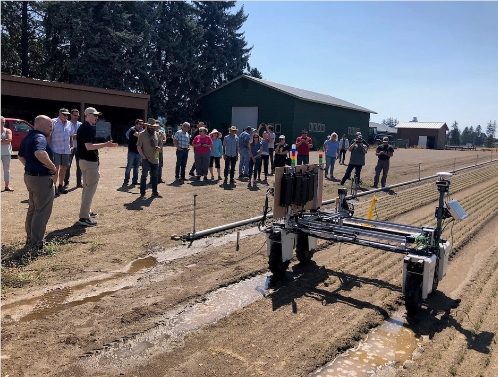The computer science research team at the University of Idaho's Coeur d’Alene campus has successfully demonstrated an autonomous robot that uses artificial intelligence (AI) technology for precise weed removal. This three-foot-wide wheeled robot can scan, identify, and accurately target weeds as small as half an inch wide, eradicating them through electric shock.

Following a demonstration at the U.S. Forest Service's Coeur d’Alene tree nursery, the development team plans to add a waterproof housing to the robot's hardware, improve the electrical components, and enhance the AI's accuracy in weed identification. Data collection and testing will continue through next year.
The robot was co-designed with the U.S. Department of Agriculture (USDA) to enhance the efficiency of reforestation within the National Forest System. As part of the Project Evergreen initiative, the University of Idaho announced in January that it had received a $139,000 grant from the USDA for the development of this system.
Former senior research scientist for the Forest Service, Kas Dumroese, stated: "This is about sustainability. The robotic equipment developed by the University of Idaho reflects the Forest Service's commitment to conservation leadership and biodiversity. Automated weeding will reduce labor costs and reliance on chemical pesticides and fossil fuels, improve the adaptability of native plants, and strengthen reforestation efforts."
The Coeur d’Alene nursery is one of six nationwide facilities operated by the Forest Service, which spends up to $500,000 annually on controlling weed growth in nurseries, with most weeding done manually. Reducing weeds helps seedlings better absorb soil nutrients, thereby lowering nursery costs and improving reforestation outcomes.
Under the REPLANT Act, part of the 2021 Infrastructure Investment and Jobs Act, the Forest Service is tasked with increasing reforestation efforts, aiming to reforest 4 million acres of American forests and plant over 1.2 billion trees within the next decade.
Dumroese, announcing the initial funding, said: "This work is a win-win for the Forest Service and the university. The university leverages its expertise and facilities to develop smart robots while cultivating students' skills in the field. For the Forest Service, this collaboration helps meet the requirements of the REPLANT Act, achieving sustainable goals for national forests, and benefiting the public."
Key Points:
- 🤖 **AI Precision Weeding**: Wheeled robot uses AI technology to identify and remove weeds.
- 🌲 **Reforestation Collaboration**: Partnership with USDA to enhance the efficiency of reforestation in the National Forest System.
- 💼 **Funding and Project**: Receives USDA funding support as part of the Project Evergreen initiative.









